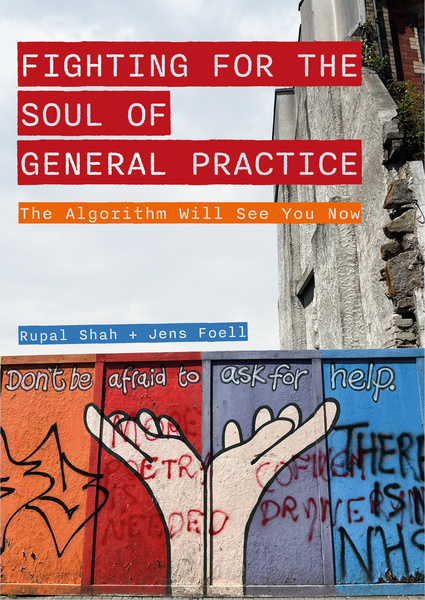Fighting for the Soul of General Practice (Book)
The Algorithm Will See You Now
A view of contemporary general practice from two practising GPs. Themes include industrialisation versus craftsmanship; the effect of protocol; and the breakdown of relational care. The theoretical perspectives introduced are illustrated through a series of anonymised anecdotes. 15 b/w illus.
Free excerpt: 'A Labour of Love'
Part of Intellect's Global Health Humanities series.
Edition
This collection of stories from two practising GPs describes the reality of working within a failing and highly bureaucratic system, where there is a balancing act: regulation versus relationships; autonomy versus standard practice; algorithm versus individual attention.
We aren’t suggesting a return to a ‘better’ time. We don’t object to being bureaucrats, embedded within and accountable to the systems we are in. But we do want to consider how and with what the gap left by the old-fashioned GP has been filled. We use stories based on our experience to describe the effect of different facets of bureaucracy on our ability to maintain a nuanced, individualised approach to each patient and encounter; and to question the prominence and effect of protocol. We are interested in the way professional relationships are influenced by protocol: between and within organisations; and most importantly with patients/clients/service users..
We are accustomed nowadays to automated telephone lines, chatbots, website FAQs- the frustration of being unable to connect with another human being who will listen to our particular question and give us something other than a generic answer. The same issues that are facing society at large have changed the way in which we work as GPs and the care we give.
Rupal Shah is a GP in Inner City London and works as an Associate Dean for NHS England. As well as her many academic publications, she is a co-author of 'Our Mothers Ourselves', a memoir of mothering.
Jens Foell is a practising GP and Academic, who is deliberately choosing to work in undifferentiated primary care rather than a specialist service. He has an interest in mental health, chronic pain and health policy and was also trained in rehabilitation and social medicine.
List of Figures
Acknowledgements
Prologue
Introduction: Standardising General Practice
1. Weaponized Bureaucracy: Bureaucracy as a Source of Injustice
2. Pigeonholes: Medical Categories
3. Guidelines, Tramlines, Mindlines: Interpreting the Evidence
4. Waiting to Connect: Algorithms That Dictate Access
5. Taking Liberties: Regulating the Mental Health Act
6. Passports for Passing: The Bureaucracy of Death
7. A Labour of Love: Why It Is That General Practice Is Still a Good Place to Work
8. Final Reflection – Image Reviewing
Conclusion
Bibliography
Index
'With increasing bureaucracy, doctors struggle to take the life pressure [sic] of their patients. This book offers a compelling reflection on the importance of listening to patient stories as opposed to applying chilly algorithms for human care. The authors provide the reader with a lively under-the-rug inspection of street-level medical practice and the turbulent business of managing through bureaucratic demands.'
'UK general practice is at a precarious crossroads. This book captures the essence of traditional, relationship-based, family doctor care, which is now under threat from a number of forces—not least the technologization of medicine and the inexorable encroachment of algorithmic, if-then decision-making on relational and narrative-based clinical method. At the very least, Shah and Foell have documented the essence of what we risk losing. Perhaps, if their warnings are heeded, they will also succeed in retaining and restoring what they rightly describe as general practice’s “soul”.'
'This is an honest dispatch from the frontlines of the conflict between industrializing bureaucracies and the ongoing care of each person. It is a hopeful song for clinicians who, when the algorithm says no, breach the protocol and go the extra mile for each patient.'
'A rich, wonderful, profound and moving book. I was immersed in the many stories and heartfelt, sometimes harrowing, observations. The need to innovatively transform health and social care, and particularly mental health care, by integrating the work of primary care with social care, local councils, voluntary sectors, communities, patients and families is now vital. Written in an authentic and deeply compassionate way, Fighting for the Soul of General Practice provides a broad and comprehensive understanding of the issues and challenges we face.'
'A wonderful analysis of where GP/ primary care sits just now in UK and the cumulative effects of misapplied EBM and service changes based on algorithms and guidelines. [...] I also found it very moving indeed. The patients' stories [...] resonated with me strongly and reminded me of many similar situations of great complexity during my time as a GP. And I agree often the key to the best --or least bad-- outcome is the doctor engaging at a human level with the patient, and the family. [...] I was really pleased to see that [the book] highlights the importance of emotional engagement and imagination.'














